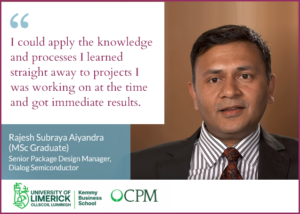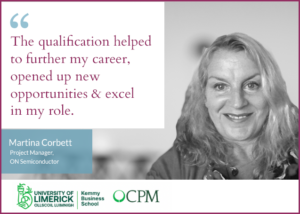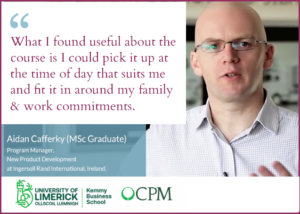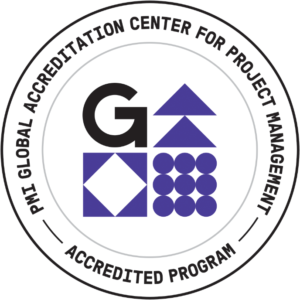Written by the Course Director of the Online Masters in Project and Programme Management at the University of Limerick.
In my role as Course Director for the Online Masters in Project and Programme Management at the University of Limerick (UL), I have interviewed hundreds of applicants for the course. Having been involved in the interview process for several years, I can reveal that there are very similar questions that crop up year after year, with many applicants regularly asking about the way the course is run and how to get the most from the experience.
To help you determine whether the course can help you fulfil your ambitions, or indeed to help you prepare for your own interview, I would like to share some of the insights I have learned from speaking to applicants. Here are the top seven questions most frequently asked before applicants decide to undertake the MSc in Project and Programme Management at UL.

Q: “I have three kids and a full-time job, but require a Masters to progress my career; how can I balance my family, work and education?”
A: The part-time online Masters in Project and Programme Management has been specifically designed to be flexible, enabling students to balance work and family life with their educational learning and assignments.
Prior to starting the programme, all learners participate in a two-week online induction programme. This provides a valuable introduction to the virtual learning environment, as well as the course content, your lecturers and classmates.
We have found that this induction proves particularly useful for people who are returning to third-level education after a break of several years. It helps to ease you into the programme, so you feel confident and motivated about beginning your modules.
Once you start the masters, each year is broken up into three semesters; the first consists of two taught modules, the second features three taught modules, and the third is composed of project work. Each taught module is five weeks long, and students have a one-week break between modules, which gives busy professionals and parents the opportunity to either take a break from studies or catch up on work duties.
Each module follows an approach to teaching and learning that is grounded in interaction, dialogue and reflection. This is based on paced asynchronous delivery, which means that you can engage and contribute at whatever times of the week suit you best.
Click here to find out more details of the course semesters and modules.
Q: “What is the workload per week for the Masters?”
A: On average, students spend around 20-25 hours per week working towards their Masters. This figure is based on feedback gathered from past course graduates, so it gives a good idea of how much time you would need to allocate to your studies. And of course, the delivery is flexible, so if you have pressing work or family commitments, it’s possible to find a balance from one week to the next. There are no restrictions on how you undertake the work, so long as you engage in the weekly online activities and stick to the module’s deadline for assessments.
Q: “Do I have to be online at specific times?”
A: No, content is delivered through narrated slide decks, podcasts, videos, academic articles or online book chapters, and case studies. There are typically two or three live sessions in a module but if you miss one due to time zone differences or have work or family obligations, you can playback the recording when it’s more convenient for you. Otherwise, most of the interaction with peers and tutors is through discussion forums.
As the course is available worldwide, it has been designed for optimum flexibility to ensure it is accessible for students in all time zones.
Q: “Are there exams at the end of the Masters course?”
A: No, there are no exams in the online Masters. Instead, students are assessed on assignments, which they complete throughout the modules.
In the first four weeks of each module, you will undertake a selection of online activities (etivities) that involve in peer-to-peer learning. These are facilitated through discussion forums that are moderated by experienced tutors. Overall, this engagement is worth 10% of your module grade.
You will also be asked to write and submit a reflective paper for the module, of around 2,500 to 3,000 words. This should include examples detailing the applied value of the insights you have gained through your learning and engagement with your peers, tutors and the content provided. This paper is worth 25% of the module grade.
Lastly, at the end of each five-week module block, you will have one or more assignments to complete, which are worth 65% of the module grade.

Q: “What are the fees for the Masters and what are the options to pay?”
A: The complete cost for the Online Masters in Project and Programme Management is €15,706 (correct of June 2020), which consists of €7,853 for year one and €7,853 for year two, year 2 is subject to change based on an increase in student levy.
Various flexible payment options are available to ensure that you can pay these fees in the way that best suits your budget. You can choose to pay in full each year, prior to starting the course, or pay in two instalments; the first before commencing semester one, and the second before commencing semester two. Alternatively, you can set up a monthly payment plan, to run over the course of the two-year programme.
For those undertaking the course with support from their current employer, we can also provide an invoice detailing the course fees for you to pass onto your organisation.
Q: “Are there any scholarships available to help fund the cost of the programme?”
A: Yes, the PMI Educational Foundation provides scholarships to support professional development for project managers who have demonstrated excellence in their field and are now seeking to further their career through a PMI accredited educational course.
The scholarships are awarded on the basis of relevant work experience and volunteer activities, as well as the level of the potential benefit that applicants can expect to gain by applying learnings from the course in their professional and/or volunteer roles.
Funding ranges from $1,000 to $7,500, which can be put towards the costs of one year. For more details on eligibility and information on how to apply, visit their website.
As such, this scholarship enables us to offer a full fee waiver for one female applicant to the online MSc in Project and Programme Management programme. To find out more about the scholarship, or how to apply, please click here.

Q: “How can I prepare for the course to get maximum value from the Masters?”
A: This is a great question and one I am asked repeatedly. To get maximum value from the course, we recommend you are employed in a project-related role or work shadow for the duration of the masters. This will enable you to apply new-found learnings straight away and will also help you bring personal insight to the assignments and peer-to-peer activities.
There are also three books that I would strongly advise you to read, which will provide you with a strong foundation of project management principles and practices. They are:
- The ‘Gower Handbook of Project Management’ edited by Rodney Turner (4th or 5th Edition)
- ‘An Introduction to Project Management’ by Kathy Schwalbe (now at 5th edition)
- ‘Project Management’ by Dennis Lock (published by Gower)
As you can see from these frequently asked questions, many students approach the course with similar concerns about finding the time and money to commit to higher education. For those looking to deepen their project management skills with a masters, the online MSc in Project and Programme Management at the University of Limerick offers a flexible and cost-effective route to career progression.
With practical content, delivered in an easily accessible format, the online Masters aims to help learners develop vital project management expertise that not only adds value to their current role but will also enhance their career opportunities in the future.
Get in touch with the course coordinator Maria O’Connell or John Kelly if you have any queries about the course, or click here to apply.
Return to News Overview






